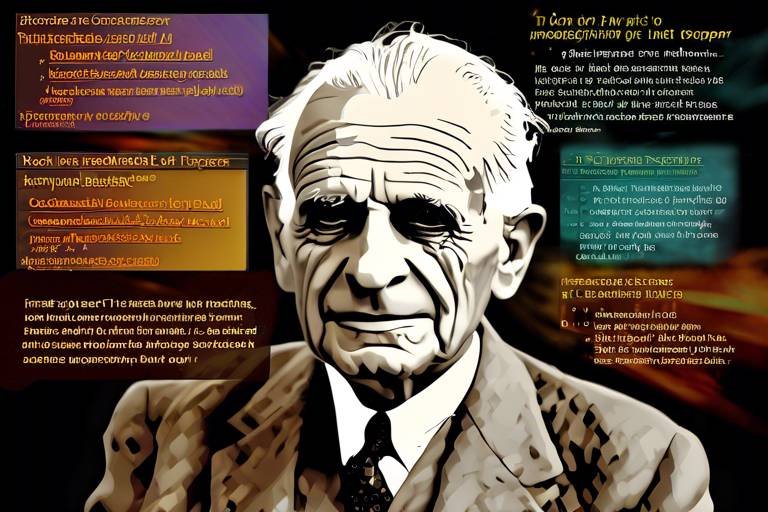Analyzing Adam Smith's Moral Philosophy and Theory of Capitalism
This article delves into the foundational aspects of Adam Smith's moral philosophy and how it intertwines with his economic theories, particularly focusing on capitalism's ethical dimensions and implications. Smith, often regarded as the father of modern economics, laid the groundwork for understanding not just how economies function, but also the moral fabric that underpins human interactions within those economies. His ideas continue to resonate today, reminding us that economic systems are not merely mechanical constructs but are deeply intertwined with our values and ethics.
Exploring the core principles of Adam Smith's moral philosophy reveals a rich tapestry of thought that centers around sympathy, justice, and the essential role of moral sentiments in shaping human interactions and economic transactions. At the heart of Smith's philosophy is the concept of sympathy, which he describes as the ability to understand and share the feelings of others. This capacity for empathy is not just a personal virtue but serves as a crucial mechanism for social cohesion. It fosters trust and collaboration, which are vital for any thriving economy.
Smith also emphasizes the importance of justice, which he sees as a fundamental principle that underlies social harmony. Without justice, the social contract that allows for economic exchange would crumble. In fact, Smith argues that a society's moral framework directly affects its economic prosperity. When individuals act with integrity and fairness, they contribute to a stable environment where economic activities can flourish.
One of Smith's most famous contributions to economic thought is the invisible hand theory, which posits that individuals pursuing their self-interest inadvertently contribute to the overall good of society. This concept suggests that when people seek to improve their own circumstances, they often create benefits for others in the process. For instance, a baker who aims to make a profit by selling bread is also providing a necessary good for the community. This self-regulating nature of the market is what allows capitalism to function efficiently.
However, the relationship between self-interest and altruism in Smith's philosophy is complex. While self-interest drives economic behavior, it does not exist in a vacuum. Altruism plays a significant role in tempering the excesses of self-interest. Smith believed that individuals are motivated not only by personal gain but also by a desire to contribute positively to society. This balance between self-interest and altruism is crucial for ethical considerations in economic behavior, highlighting the need for a moral compass in capitalism.
Competition, driven by self-interest, is another pivotal element in Smith's economic framework. It fosters innovation and efficiency, pushing businesses to improve their products and services continually. However, competition also presents ethical challenges. For instance, companies might resort to unethical practices to outdo their rivals. This is where Smith's moral philosophy becomes essential, as it encourages a system where competition exists within a framework of ethical standards, promoting fair play and responsibility.
Despite the strengths of the invisible hand, there are scenarios where it fails, leading to market failures. These failures highlight the importance of ethical considerations in economic practices. For example, environmental degradation or monopolistic practices can arise when the pursuit of self-interest overshadows moral responsibilities. Smith's moral philosophy provides insights into addressing these dilemmas, advocating for a balance between economic pursuits and ethical obligations.
Understanding the significance of moral sentiments in Smith's work is crucial for grasping the implications for ethical capitalism. Smith believed that empathy and social responsibility are essential components of a functioning economy. Businesses that prioritize ethical practices and consider the welfare of their stakeholders not only contribute to a healthier society but also enhance their long-term viability. In this way, moral sentiments become a guiding force in shaping economic practices that align with broader societal values.
Assessing how Adam Smith's moral philosophy and economic theories continue to shape contemporary discussions on capitalism reveals their enduring relevance. Policymakers and economists alike draw from Smith's insights when addressing issues such as economic inequality, corporate responsibility, and sustainable development. His work serves as a reminder that economic systems should not only focus on efficiency and growth but also consider the ethical implications of those systems.
Modern economists and philosophers reinterpret Smith's ideas in light of today's economic challenges. For instance, the growing concern over wealth inequality has prompted a reevaluation of Smith's notions of self-interest and the invisible hand. Many argue that without a strong ethical foundation, capitalism can lead to significant disparities in wealth and opportunity. This has led to discussions about the need for regulations and policies that promote a more equitable distribution of resources.
A critical analysis of the limitations and critiques of Smith's moral philosophy reveals a spectrum of alternative viewpoints. Some argue that Smith's emphasis on self-interest can lead to a disregard for social welfare, while others believe that his ideas are too simplistic for today's complex economic landscape. Nonetheless, Smith's theories remain a vital part of the conversation, encouraging ongoing discourse about the ethical dimensions of capitalism.
- What is Adam Smith known for?
Adam Smith is known as the father of modern economics and is famous for his works on moral philosophy and economic theory, particularly the concept of the invisible hand. - How does sympathy play a role in Smith's philosophy?
Sympathy is central to Smith's moral philosophy, emphasizing the importance of empathy and understanding in human interactions and economic transactions. - What are market failures?
Market failures occur when the allocation of goods and services is not efficient, leading to negative outcomes such as monopolies or environmental harm. - How relevant are Smith's ideas today?
Smith's ideas continue to influence modern discussions on capitalism, ethics, and social responsibility, particularly in addressing issues like inequality and corporate ethics.

The Foundations of Moral Philosophy
Adam Smith, often hailed as the father of modern economics, was not just a number-crunching economist; he was a profound thinker whose ideas about morality and ethics shaped the very foundations of capitalism. At the heart of his moral philosophy lies the concept of sympathy, which he believed was essential for human interactions. Sympathy, in Smith's view, is the ability to understand and share the feelings of others. It fosters a sense of community and mutual respect, which are vital for any functioning society. Imagine a world where everyone acted solely out of self-interest—chaos would reign! This is why Smith emphasized that moral sentiments play a crucial role in our social fabric.
Moreover, Smith introduced the concept of justice, which he saw as a cornerstone of moral philosophy. Justice is not merely about legal frameworks; it's about fairness, equity, and the moral obligations we owe to one another. In the marketplace, this translates to the idea that while individuals pursue their own interests, they must also consider the well-being of others. This duality is what makes Smith's philosophy so compelling. He argued that true economic prosperity cannot exist without a moral underpinning that promotes justice and empathy.
Smith's emphasis on moral sentiments can be summarized in three main principles:
- Empathy: The ability to connect with others emotionally.
- Fairness: Ensuring that everyone has a fair shot in economic transactions.
- Accountability: Recognizing that our actions have consequences for others.
These principles highlight that economic transactions are not merely transactional; they are deeply embedded in our moral framework. When we engage in commerce, we are not just exchanging goods and services; we are also engaging in a social contract that demands ethical behavior. Smith believed that the best outcomes in capitalism arise when individuals act with a sense of moral responsibility. This perspective is particularly relevant today, as we navigate the complexities of a global economy marred by inequality and ethical dilemmas.
In essence, Adam Smith's moral philosophy is a call to balance self-interest with a commitment to the greater good. It challenges us to look beyond our immediate gains and consider how our actions impact others. His insights remind us that the true measure of a successful economy is not just in profits but in the well-being of its people. As we delve deeper into the intricacies of capitalism, we must not forget that at its core lies a moral imperative that calls for empathy, justice, and a sense of shared responsibility.

The Invisible Hand Concept
The concept of the invisible hand is one of the most intriguing and often discussed aspects of Adam Smith's economic philosophy. At its core, this idea suggests that when individuals act in their own self-interest, they inadvertently contribute to the greater good of society. Imagine a bustling marketplace where each seller is focused solely on maximizing their own profits. As they do so, they are also meeting the needs of consumers, creating a symbiotic relationship that benefits everyone involved. It's a bit like a dance where each dancer, while focused on their own steps, contributes to the beauty of the performance as a whole.
Smith posited that this self-regulating mechanism of the market operates without the need for central planning or intervention. Instead of a conductor directing the orchestra, it’s as if each musician knows their role and plays it to perfection, resulting in a harmonious outcome. This phenomenon is what Smith refers to as the invisible hand, guiding the economy towards efficiency and productivity. But how does this work in practice? Let's break it down:
- Self-Interest Drives Innovation: When individuals and businesses seek to improve their own circumstances, they often innovate. This innovation leads to new products, services, and techniques that benefit society.
- Resource Allocation: The invisible hand ensures that resources are allocated where they are most needed. As demand for a product increases, so does its price, signaling producers to supply more of it.
- Competition Enhances Quality: In a free market, competition encourages businesses to improve their offerings. As they strive to attract customers, the quality of goods and services typically rises.
However, the invisible hand is not without its complexities. While it suggests a natural order, it also raises questions about the ethical implications of self-interest. For instance, what happens when the pursuit of profit leads to negative externalities, such as environmental degradation or exploitation of labor? In these cases, the invisible hand may falter, leading to market failures where the interests of individuals do not align with the welfare of society. Herein lies the crux of the matter: while Smith celebrated the power of self-interest, he also recognized the need for moral sentiments to guide economic behavior.
In essence, the invisible hand serves as a powerful metaphor for the dynamics of capitalism. It illustrates how individual actions can lead to collective outcomes, but it also invites us to ponder the ethical dimensions of those actions. As we navigate the complexities of modern capitalism, the challenge remains: how do we ensure that the invisible hand works for the benefit of all, rather than just a select few?

invisible hand
This article delves into the foundational aspects of Adam Smith's moral philosophy and how it intertwines with his economic theories, particularly focusing on capitalism's ethical dimensions and implications.
Exploring the core principles of Adam Smith's moral philosophy, including the concepts of sympathy, justice, and the role of moral sentiments in human interactions and economic transactions.
When we think about capitalism, one of the most intriguing ideas that pops up is Adam Smith's . This metaphor is like a magic trick—where individual pursuits of self-interest lead to outcomes that benefit society as a whole, almost as if guided by an unseen force. Imagine a bustling marketplace, where every buyer and seller is trying to get the best deal possible. In this chaotic dance, each participant is not consciously working for the greater good, yet their actions collectively contribute to the economy's health. It's a bit like how a flock of birds moves in perfect harmony without a leader; they follow their instincts, and the result is a beautiful, synchronized flight.
Smith argued that when individuals are free to pursue their own interests, they inadvertently promote the welfare of others. This is the essence of the invisible hand—people acting in their own interest can lead to positive social outcomes. For instance, a baker bakes bread not out of a desire to feed the community, but because he wants to earn a living. Yet, in doing so, he provides a necessary good that benefits everyone. This interplay between individual ambition and collective benefit is what makes capitalism tick. However, it does raise questions: are we, as individuals, truly aware of the broader implications of our actions? Can we trust that our self-serving motivations will always align with the common good?
A discussion on the balance between self-interest and altruism in Smith's philosophy, highlighting how these two forces coexist and influence economic behavior and ethical considerations.
Analyzing how competition, driven by self-interest, fosters innovation and efficiency in a capitalist economy while also posing ethical challenges that require moral considerations.
Investigating scenarios where the invisible hand fails, leading to market failures, and how Smith's moral philosophy provides insights into addressing these ethical dilemmas.
Understanding the significance of moral sentiments in Smith's work and their implications for ethical capitalism, emphasizing the need for empathy and social responsibility in economic practices.
Assessing how Adam Smith's moral philosophy and economic theories continue to shape contemporary discussions on capitalism, ethics, and social welfare, influencing policymakers and economists alike.
Exploring how modern economists and philosophers reinterpret Smith's ideas in light of current economic challenges, including inequality, corporate responsibility, and sustainable development.
A critical analysis of the limitations and critiques of Smith's moral philosophy and capitalism, examining alternative viewpoints and the relevance of his theories in today's complex economic landscape.
- What is the invisible hand theory? The invisible hand theory suggests that individuals pursuing their self-interest inadvertently contribute to the overall good of society.
- How does self-interest benefit society? When individuals act in their own interest, they create goods and services that others need, which contributes to economic growth.
- Are there limitations to the invisible hand? Yes, there are scenarios such as market failures where the invisible hand does not lead to optimal outcomes, necessitating ethical considerations and interventions.

theory, which posits that individuals pursuing their self-interest inadvertently contribute to the overall good of society, shaping the dynamics of capitalism.
This article delves into the foundational aspects of Adam Smith's moral philosophy and how it intertwines with his economic theories, particularly focusing on capitalism's ethical dimensions and implications.
Exploring the core principles of Adam Smith's moral philosophy, including the concepts of sympathy, justice, and the role of moral sentiments in human interactions and economic transactions.
Smith's invisible hand theory is a cornerstone of his economic thought, suggesting that individuals pursuing their own self-interest inadvertently contribute to the overall good of society. Imagine a bustling marketplace where each person is focused on their own needs and desires—buying the freshest produce, seeking the best prices, or finding the most convenient services. While each individual is primarily concerned with their own benefit, the collective actions of all these individuals lead to a thriving economy that benefits everyone. This phenomenon illustrates how personal ambitions can align seamlessly with societal welfare.
A discussion on the balance between self-interest and altruism in Smith's philosophy, highlighting how these two forces coexist and influence economic behavior and ethical considerations.
Analyzing how competition, driven by self-interest, fosters innovation and efficiency in a capitalist economy while also posing ethical challenges that require moral considerations.
Investigating scenarios where the invisible hand fails, leading to market failures, and how Smith's moral philosophy provides insights into addressing these ethical dilemmas.
Understanding the significance of moral sentiments in Smith's work and their implications for ethical capitalism, emphasizing the need for empathy and social responsibility in economic practices.
Assessing how Adam Smith's moral philosophy and economic theories continue to shape contemporary discussions on capitalism, ethics, and social welfare, influencing policymakers and economists alike.
Exploring how modern economists and philosophers reinterpret Smith's ideas in light of current economic challenges, including inequality, corporate responsibility, and sustainable development.
A critical analysis of the limitations and critiques of Smith's moral philosophy and capitalism, examining alternative viewpoints and the relevance of his theories in today's complex economic landscape.
- What is the invisible hand theory?
The invisible hand theory suggests that individuals seeking their own self-interest can lead to positive outcomes for society as a whole. - How does self-interest contribute to the economy?
Self-interest drives individuals to innovate and improve efficiency, which can lead to economic growth and prosperity. - Are there ethical concerns with capitalism?
Yes, while capitalism can foster growth, it can also lead to inequality and market failures, raising important ethical questions.

Self-Interest vs. Altruism
When we delve into the intricate dance between self-interest and altruism in Adam Smith's moral philosophy, it’s like examining two sides of the same coin. On one hand, we have self-interest, which Smith argued is a powerful motivator for human behavior and economic activity. It’s the engine that drives innovation, competition, and wealth creation. Think about it: when you pursue your own goals, whether it’s landing that dream job or starting a successful business, you’re not just looking out for yourself; you’re also contributing to the economy. This is where the concept of the invisible hand comes into play, suggesting that by seeking our own gain, we inadvertently promote the welfare of society.
However, the other side of this coin is altruism—the genuine concern for the well-being of others. In Smith's view, this isn’t just a nice-to-have; it’s a fundamental aspect of our moral fabric. Altruism tempers self-interest, reminding us that our actions have consequences beyond our personal gain. It’s like being on a team; sure, you want to score the winning goal, but if you only focus on yourself, you risk alienating your teammates and undermining the collective effort. In a capitalist society, this balance is crucial. Without altruism, self-interest can lead to exploitation, inequality, and a breakdown of trust.
Smith believed that the interplay between these two forces is essential for a healthy society. He argued that while self-interest drives economic progress, altruism fosters social cohesion. For example, consider a local business that thrives because its owner is passionate about providing quality service and supporting the community. This owner’s self-interest in running a profitable enterprise does not negate the altruistic actions of sponsoring local events or employing residents. Instead, these actions enhance the community’s well-being, creating a ripple effect of benefits.
To further illustrate this point, let’s look at a simple table that highlights the differences and interactions between self-interest and altruism:
| Aspect | Self-Interest | Altruism |
|---|---|---|
| Definition | Pursuit of personal gain | Concern for others' welfare |
| Motivation | Profit, success, personal achievement | Empathy, social responsibility, community support |
| Outcome | Economic growth, innovation | Social cohesion, trust, community well-being |
| Potential Risks | Exploitation, inequality | Neglect of self, dependency |
In conclusion, the relationship between self-interest and altruism in Smith's philosophy is not one of opposition but rather of interdependence. Both forces are necessary for a balanced and ethical capitalist society. Striking the right balance between pursuing personal goals and caring for the community is what ultimately leads to a thriving economy and a just society. So, the next time you find yourself navigating the waters of self-interest and altruism, remember that these two elements can coexist harmoniously, driving both personal success and societal well-being.
- What is Adam Smith's view on self-interest? Smith believed that self-interest is a natural motivator that can lead to positive societal outcomes through the invisible hand.
- How does altruism fit into Smith's philosophy? Altruism tempers self-interest, ensuring that economic pursuits do not undermine social welfare and community bonds.
- Can self-interest and altruism coexist? Yes, Smith argued that these forces can work together, with self-interest driving innovation while altruism fosters social responsibility.

The Role of Competition
Competition is often seen as the lifeblood of a capitalist economy, and Adam Smith recognized its dual nature. On one hand, competition drives innovation, efficiency, and progress; on the other, it can lead to ethical dilemmas and social disparities. Imagine a race where every participant is striving to reach the finish line first. Each runner pushes themselves harder, spurred on by the desire to outpace their rivals. In the same way, businesses in a competitive market are constantly innovating and improving their products and services to attract customers. This relentless pursuit of excellence results in a better selection for consumers and often lower prices.
However, it's essential to understand that competition isn't just about being the fastest or the best. It also involves a complex interplay of ethical considerations. For instance, while competition can lead to groundbreaking advancements, it can also foster a cutthroat mentality where companies prioritize profit over people. This raises the question: how do we ensure that competition remains healthy and does not devolve into exploitation? Here, Smith's moral philosophy comes into play, reminding us that the ultimate goal should not just be economic gain, but also the well-being of society as a whole.
To illustrate the impact of competition, consider the following table that outlines both the positive and negative effects:
| Positive Effects | Negative Effects |
|---|---|
| Encourages innovation and creativity | Can lead to unethical business practices |
| Improves product quality and variety | May result in monopolies or oligopolies |
| Lowers prices for consumers | Can create a race to the bottom in wages |
In Smith's view, healthy competition is essential for a thriving economy, yet it requires a moral framework to guide it. This is where the concept of 'moral sentiments' plays a crucial role. When businesses compete, they should also consider their impact on employees, customers, and the community. This ethical consideration ensures that the pursuit of profit does not come at the expense of human dignity or social responsibility.
Moreover, competition can serve as a catalyst for collaboration. In an environment where businesses are competing fiercely, they may also find opportunities to work together on common challenges, such as sustainability and corporate social responsibility. By joining forces, companies can tackle issues that no single entity could address alone, ultimately benefiting both the market and society.
In conclusion, the role of competition in capitalism is multifaceted. While it undoubtedly fuels progress and innovation, it also presents ethical challenges that must be navigated carefully. Adam Smith's insights remind us that competition should not exist in a vacuum; rather, it should be accompanied by a strong moral compass that prioritizes the greater good. This balance is crucial for fostering an economic environment where both businesses and society can thrive.
- What is the primary role of competition in capitalism?
Competition drives innovation, efficiency, and lower prices, benefiting consumers and encouraging businesses to improve. - How can competition lead to unethical practices?
In the pursuit of profit, companies may engage in practices that exploit workers, mislead consumers, or harm the environment. - What did Adam Smith believe about the balance of competition and ethics?
Smith believed that while competition is essential for economic success, it should be guided by moral sentiments and a sense of social responsibility.

Market Failures and Ethics
Market failures represent a fascinating intersection of economics and ethics, particularly within the framework of Adam Smith's moral philosophy. When we talk about market failures, we're referring to situations where the allocation of goods and services is not efficient, leading to a net loss in social welfare. This concept is crucial because it challenges the notion that free markets always lead to optimal outcomes. Instead, market failures highlight the limitations of the invisible hand, revealing scenarios where individual pursuits of self-interest can lead to unintended negative consequences for society as a whole.
For instance, consider the classic example of externalities—these are costs or benefits that affect third parties who did not choose to incur those costs or benefits. A factory that pollutes a river may maximize its profits by cutting corners on environmental regulations, but the local community suffers from the resulting pollution. Here, the ethical implications are stark. Should the factory be allowed to operate without constraints, simply because it is pursuing its self-interest? This situation raises profound questions about social responsibility and the moral obligations of businesses to their communities.
Another significant aspect of market failures is the issue of public goods. These are goods that are non-excludable and non-rivalrous, meaning that one person's use of the good does not diminish another's ability to use it. A classic example is national defense. If left to the market, public goods are often underproduced because individuals may choose to free-ride on the contributions of others. This leads to a gap between what is socially optimal and what is actually provided, necessitating government intervention. In this context, Smith's moral philosophy can be invoked to argue for a more ethical approach to managing public goods, emphasizing the need for collective responsibility and cooperation.
To further illustrate the relationship between market failures and ethics, we can look at the following table that summarizes key types of market failures and their ethical implications:
| Type of Market Failure | Description | Ethical Implications |
|---|---|---|
| Externalities | Costs or benefits affecting third parties not involved in a transaction. | Question of social responsibility and accountability for negative impacts. |
| Public Goods | Goods that are non-excludable and non-rivalrous, leading to underproduction. | Need for collective action and government intervention to ensure fair access. |
| Monopolies | Single firms dominating the market, leading to higher prices and less innovation. | Ethical concerns regarding consumer welfare and market fairness. |
| Information Asymmetry | Situations where one party has more or better information than the other. | Trust issues and the ethical obligation to provide transparent information. |
In light of these considerations, it becomes evident that addressing market failures requires more than just economic solutions; it demands a robust ethical framework. Adam Smith's emphasis on moral sentiments, such as empathy and justice, can guide us in developing policies that not only correct market inefficiencies but also uphold ethical standards. By integrating ethical considerations into economic decision-making, we can work towards a more equitable society where the benefits of capitalism are shared more broadly and responsibly.
- What are market failures? Market failures occur when the allocation of goods and services is not efficient, leading to a loss of social welfare.
- How do externalities relate to market failures? Externalities are costs or benefits that affect third parties and can lead to market failures when they are not accounted for in transactions.
- Why are public goods considered a market failure? Public goods are often underproduced in a free market because individuals may choose to benefit without contributing, leading to inefficiencies.
- What ethical considerations arise from market failures? Market failures raise questions about social responsibility, accountability, and the need for collective action to ensure fair access to resources.

The Moral Sentiments and Capitalism
When we dive into the depths of Adam Smith's work, we can't overlook the profound role of moral sentiments in shaping his economic theories. Smith believed that our ability to empathize with others is not just a nice-to-have trait; it's a fundamental aspect of our humanity that directly influences our economic behaviors. Imagine walking into a bustling marketplace. Each transaction is not merely a financial exchange but a reflection of shared human experiences and emotions. This is where Smith's moral sentiments come into play, intertwining with the fabric of capitalism.
At the heart of Smith's moral philosophy is the idea that our actions are guided by an innate sense of sympathy. This sentiment compels us to consider the impact of our decisions on others. In a capitalist society, where the pursuit of profit often takes precedence, this moral compass can sometimes feel overshadowed. However, Smith argued that a balance can be struck—where self-interest and moral sentiments coexist, fostering a more humane approach to capitalism.
To illustrate this, consider the following scenario: a company decides to implement sustainable practices not just for profit but because they genuinely care about the environment and their community. This decision is rooted in moral sentiments—an understanding of the broader impact of their actions. Such ethical considerations can lead to a more responsible form of capitalism, one that prioritizes social welfare alongside financial gain.
Furthermore, Smith’s emphasis on moral sentiments suggests that economic interactions are not devoid of ethics. He believed that when individuals engage in commerce, they should be guided by a sense of justice and fairness. This notion challenges the often-held belief that capitalism is simply about competition and profit maximization. Instead, it opens the door to a more ethical capitalism, where businesses are accountable not just to shareholders but also to the communities they serve.
In this light, we can see how moral sentiments can lead to what is often referred to as corporate social responsibility (CSR). Companies that embrace CSR recognize that their operations impact society at large. By integrating ethical considerations into their business models, they not only enhance their reputation but also contribute positively to the social fabric. This is the essence of capitalism infused with moral sentiments—a system where empathy and economic success go hand in hand.
However, it's crucial to acknowledge that the integration of moral sentiments into capitalism is not without its challenges. There are instances where the invisible hand of the market fails to account for ethical considerations, leading to scenarios where profit motives can override moral imperatives. This is where the true test of capitalism lies: in finding ways to address these ethical dilemmas without stifling innovation or economic growth.
In conclusion, the interplay between moral sentiments and capitalism is a complex yet fascinating subject. As we move forward in an increasingly interconnected world, the need for empathy and social responsibility becomes ever more critical. By embracing Smith's insights, we can strive for a form of capitalism that not only drives economic progress but also uplifts society as a whole.
- What are moral sentiments in Adam Smith's philosophy?
Moral sentiments refer to the feelings of empathy and sympathy that guide human interactions and economic transactions, emphasizing the importance of ethics in capitalism. - How do moral sentiments influence capitalism?
Moral sentiments encourage businesses and individuals to consider the social impact of their actions, promoting a more responsible and ethical approach to economic practices. - Can capitalism be ethical?
Yes, capitalism can be ethical when it incorporates moral sentiments and prioritizes social responsibility alongside profit-making.

The Influence of Smith's Ideas Today
Adam Smith, often hailed as the father of modern economics, has left an indelible mark on how we perceive capitalism and its ethical implications. His ideas resonate profoundly in today’s economic landscape, where the balance between profit and social responsibility is more crucial than ever. In a world grappling with issues like inequality and environmental degradation, Smith's moral philosophy offers a framework that encourages not just self-interest, but also a sense of community and empathy.
One of the most significant ways Smith's ideas manifest today is through the ongoing debate around corporate responsibility. Companies are no longer seen merely as profit-making entities; they are increasingly expected to act as good corporate citizens. This shift aligns with Smith's assertion that the pursuit of self-interest should not come at the expense of societal welfare. Organizations now recognize that their long-term success is intertwined with community well-being, leading to initiatives that prioritize sustainability and ethical practices.
Moreover, the concept of the "invisible hand" continues to be a topic of discussion among economists and policymakers. While Smith argued that individuals acting in their self-interest could inadvertently benefit society, today’s economic challenges—such as climate change and social inequality—pose questions about the limits of this theory. Are markets truly capable of self-regulating in a way that benefits everyone? Or do we need to introduce more robust regulations to ensure that the invisible hand does not falter?
In contemporary discussions, Smith's ideas are often revisited in the context of economic inequality. The growing divide between the rich and the poor has prompted economists to rethink how capitalism operates. Some argue that Smith’s vision of a competitive market has been distorted, leading to monopolies and wealth concentration that contradict his principles of fairness and justice. This has led to a resurgence of interest in Smith's moral sentiments, emphasizing the need for empathy and social responsibility in economic practices.
Furthermore, Smith's influence can be seen in the rise of social enterprises and impact investing, where the goal is to achieve social good alongside financial returns. This aligns perfectly with Smith’s belief in the importance of moral sentiments in economic interactions. Investors are increasingly looking for opportunities that not only promise financial returns but also contribute positively to society. This shift reflects a broader understanding that ethical considerations are essential for sustainable economic growth.
To illustrate how Smith's ideas are being applied today, consider the following table that showcases various sectors influenced by his principles:
| Sector | Application of Smith's Ideas |
|---|---|
| Corporate Responsibility | Companies implementing sustainable practices and community engagement. |
| Social Enterprises | Businesses aiming for social impact alongside profit. |
| Impact Investing | Investors prioritizing ethical returns and social change. |
| Public Policy | Regulations aimed at reducing inequality and promoting fairness. |
As we navigate the complexities of the modern economy, the relevance of Adam Smith's moral philosophy cannot be overstated. His ideas challenge us to reconsider not just how we conduct business, but also how we define success in our economic systems. By integrating ethical considerations into capitalism, we can create a more equitable and sustainable future, reflecting the very essence of Smith's vision.
- What are the main principles of Adam Smith's moral philosophy?
Smith's moral philosophy is centered around sympathy, justice, and the importance of moral sentiments in human interactions. - How does the invisible hand work in today's economy?
The invisible hand suggests that individuals pursuing their self-interest can lead to positive societal outcomes, though it may require regulation to address modern challenges. - What is the significance of corporate responsibility in Smith's ideas?
Corporate responsibility aligns with Smith's belief that businesses should contribute to societal welfare, promoting ethical practices alongside profit-making. - How do modern interpretations of Smith differ from traditional views?
Modern interpretations often emphasize the need for social responsibility and ethical considerations in capitalism, addressing issues like inequality and sustainability.

Modern Interpretations of Smith
In the ever-evolving landscape of economics, Adam Smith's ideas have not only survived but have also been reinterpreted to meet contemporary challenges. Today, many economists and philosophers dig deep into Smith's work, unearthing insights that resonate with current issues such as income inequality, corporate responsibility, and sustainable development. It's fascinating to see how these modern interpretations breathe new life into Smith's original theories, demonstrating their relevance in a world that often feels drastically different from the 18th century.
One of the most significant shifts in understanding Smith's philosophy relates to the concept of self-interest. While Smith famously argued that individuals acting in their own self-interest could lead to societal benefits, modern thinkers emphasize the need for a balance between this self-interest and a sense of social responsibility. They argue that in today's global economy, unchecked self-interest can lead to significant disparities in wealth and power, sparking debates about ethical capitalism. For instance, the rise of corporate social responsibility (CSR) initiatives can be seen as a direct response to Smith's ideas, where businesses are encouraged to consider the broader impact of their actions on society and the environment.
Furthermore, the notion of the invisible hand has been critically examined in light of market failures. In an age where monopolies can dominate entire industries, the ideal of a self-regulating market appears increasingly naïve. Modern economists often point out that while the invisible hand can guide markets towards efficiency, it can also lead to situations where public goods are underprovided or externalities are ignored. This has prompted a re-evaluation of Smith’s theories, pushing for a more nuanced understanding that incorporates regulatory frameworks to address these market failures.
Moreover, the ethical dimensions of capitalism have gained traction in contemporary discussions. As we face global challenges like climate change and social injustice, Smith's emphasis on moral sentiments takes on new significance. Modern interpretations encourage a return to these moral foundations, advocating for empathy and ethical considerations in economic practices. This perspective aligns with the growing trend of ethical investing, where investors seek not just financial returns but also positive social and environmental impacts.
In summary, Adam Smith's theories are not static relics of the past; they are dynamic frameworks that continue to inspire and challenge us. By examining his work through a modern lens, we can appreciate the complexities of capitalism and the ethical responsibilities that come with it. As we navigate the intricate web of today's economic landscape, Smith's insights remind us that self-interest and altruism are not mutually exclusive but can coexist to foster a more equitable society.
- What is the main idea behind Adam Smith's invisible hand theory?
The invisible hand theory suggests that individuals pursuing their own self-interest can lead to positive societal outcomes, as if guided by an unseen force. - How do modern interpretations of Smith address income inequality?
Modern interpretations emphasize the need for a balance between self-interest and social responsibility, advocating for ethical practices and corporate accountability to mitigate income inequality. - What role do moral sentiments play in capitalism today?
Moral sentiments highlight the importance of empathy and ethical considerations in economic practices, promoting a more socially responsible approach to capitalism.

Critiques and Counterarguments
While Adam Smith's moral philosophy and economic theories have laid the groundwork for modern capitalism, they have not escaped scrutiny. Critics argue that his ideas, particularly the concept of the invisible hand, may oversimplify the complexities of human behavior and economic interactions. For instance, the assumption that individuals acting in their own self-interest will naturally lead to societal benefits is seen by many as overly optimistic. In reality, this can lead to outcomes where the rich get richer and the poor get poorer, raising questions about the ethical implications of such disparities.
Additionally, some scholars point out that Smith's focus on self-interest can undermine the importance of community and social responsibility. They argue that a purely self-interested approach can foster a competitive environment where ethical considerations are sidelined. This raises an essential question: Can a system that prioritizes individual gain truly support the common good? Critics contend that without a strong ethical framework, capitalism risks becoming a zero-sum game, where one's gain is another's loss.
Furthermore, the rise of monopolies and corporate power in contemporary markets challenges the notion that competition, as envisioned by Smith, will always lead to positive outcomes. In many cases, large corporations can stifle competition, manipulate markets, and prioritize profit over ethical considerations. This leads to market failures, where the invisible hand falters, and the resulting economic landscape becomes riddled with inequality and exploitation.
To illustrate these critiques, consider the following table that summarizes some key counterarguments to Smith's theories:
| Critique | Description |
|---|---|
| Oversimplification of Human Behavior | Critics argue that self-interest does not always lead to societal benefits, as human motivations are complex and varied. |
| Neglect of Social Responsibility | Smith's emphasis on self-interest can overshadow the importance of community and ethical obligations in economic transactions. |
| Monopolies and Market Failures | The rise of monopolistic practices challenges the idea that competition always fosters innovation and fair pricing. |
In light of these critiques, many modern economists and philosophers advocate for a more nuanced understanding of capitalism that incorporates ethical considerations. They argue for a balance between self-interest and altruism, suggesting that moral sentiments must play a vital role in shaping economic behavior. This perspective aligns with Smith's own acknowledgment of the importance of sympathy and justice in human interactions, urging us to re-evaluate how we approach economic systems today.
Ultimately, while Adam Smith's contributions to moral philosophy and capitalism are invaluable, engaging with critiques and counterarguments is essential for evolving our understanding of these concepts. By recognizing the limitations of Smith's theories, we can work towards a more ethical and equitable economic framework that addresses the challenges of our time.
- What is the invisible hand theory?
The invisible hand theory, proposed by Adam Smith, suggests that individuals pursuing their self-interest can inadvertently benefit society as a whole, leading to economic growth and efficiency. - How does Adam Smith view competition?
Adam Smith viewed competition as a driving force for innovation and efficiency in a capitalist economy, but he also acknowledged that it could lead to ethical challenges. - What are the main critiques of Adam Smith's moral philosophy?
Critics argue that Smith's focus on self-interest can undermine social responsibility, oversimplifies human behavior, and fails to address the issues caused by monopolies and market failures. - How relevant are Smith's ideas today?
Smith's ideas continue to influence discussions on capitalism, ethics, and social welfare, prompting modern economists to reinterpret his theories in light of contemporary economic challenges.
Frequently Asked Questions
- What are the core principles of Adam Smith's moral philosophy?
Adam Smith's moral philosophy revolves around the concepts of sympathy, justice, and moral sentiments. He believed that human interactions and economic transactions are guided by these principles, emphasizing the importance of empathy and ethical considerations in our behaviors.
- What does the "invisible hand" concept mean?
The "invisible hand" is a metaphor used by Adam Smith to describe how individuals pursuing their self-interest can inadvertently contribute to the overall good of society. This concept illustrates how personal ambitions can lead to beneficial outcomes for the community, shaping the dynamics of capitalism.
- How do self-interest and altruism coexist in Smith's philosophy?
In Adam Smith's view, self-interest and altruism are not mutually exclusive. Instead, they coexist and influence each other in economic behavior. While individuals may act out of self-interest, their actions can also lead to altruistic outcomes, highlighting the complex interplay between personal gain and social responsibility.
- What role does competition play in a capitalist economy?
Competition, driven by self-interest, is essential in a capitalist economy as it fosters innovation and efficiency. However, it also presents ethical challenges, requiring a balance between pursuing profit and maintaining moral standards in business practices.
- What are market failures, and how does Smith's philosophy address them?
Market failures occur when the invisible hand fails to allocate resources efficiently, leading to negative outcomes for society. Smith's moral philosophy suggests that ethical considerations and interventions may be necessary to address these failures, promoting a more just and equitable economic system.
- How do moral sentiments relate to capitalism?
Moral sentiments are crucial in Smith's work, as they emphasize the need for empathy and social responsibility in economic practices. He argued that an ethical approach to capitalism can lead to better outcomes for society, reinforcing the importance of moral considerations in business decisions.
- How do Adam Smith's ideas influence modern discussions on capitalism?
Adam Smith's moral philosophy and economic theories continue to shape contemporary debates on capitalism, ethics, and social welfare. Policymakers and economists draw on his insights to address current challenges, including inequality and corporate responsibility, demonstrating the lasting relevance of his work.
- What are some modern interpretations of Smith's ideas?
Modern economists and philosophers reinterpret Smith's ideas to address current economic challenges, such as inequality and sustainable development. They explore how his principles can guide contemporary practices in a rapidly changing economic landscape, ensuring that ethical considerations remain at the forefront.
- What critiques exist regarding Smith's moral philosophy and capitalism?
Critiques of Smith's moral philosophy often focus on its limitations and the potential for exploitation within capitalism. Alternative viewpoints argue that his theories may not adequately address issues like income inequality and environmental sustainability, prompting ongoing discussions about their relevance in today's complex economic environment.


















